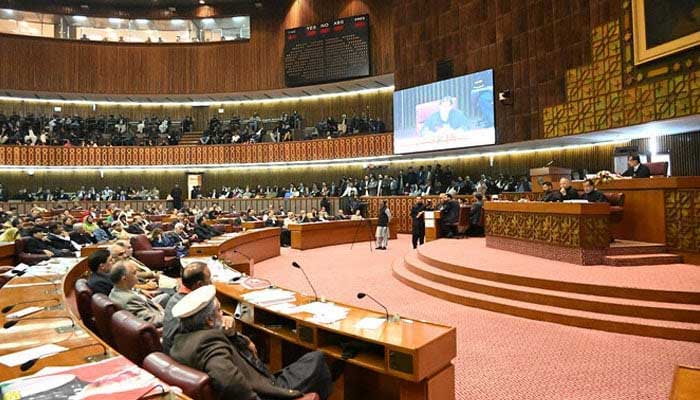The PTI boycott of the National Assembly has opened a new front in Pakistan’s political battle. Acting on Imran Khan’s directives, the party announced it will no longer participate in assembly proceedings. Instead, PTI lawmakers will hold peaceful protests outside the Parliament House, calling the move a stand against what they describe as suppression of their democratic rights.
Decision Rooted in Leadership’s Call
PTI Chairman Barrister Gohar Ali Khan revealed that the boycott decision came directly from party founder Imran Khan. He stressed that all parliamentary members endorsed the move. According to Gohar, the decision marks a shift from raising issues inside the assembly to protesting outside its doors.
The party views this as the only remaining path to highlight grievances. PTI leaders argue that attempts to voice concerns inside the assembly were consistently blocked. With this move, the party aims to stage symbolic gatherings that reflect both resistance and resilience.
Mounting Legal Troubles for PTI
The boycott comes amid mounting legal challenges for PTI. Several prominent members, including Omar Ayub and Shibli Faraz, were disqualified following court verdicts linked to the May 9 riots. These rulings have intensified pressure on the already embattled party.
The disqualifications removed senior lawmakers who played key roles in parliamentary debates. PTI leaders say the timing and nature of the rulings left their party silenced within the legislative process. The boycott, therefore, becomes both a protest and a political strategy to keep their voices alive outside the chamber.
Read: Pakistan Achieves Record Rs 2,600b Debt Retirement
A Shift to Street Politics
Addressing the media, Gohar Ali Khan explained why the decision was unavoidable. He said PTI members were not allowed to participate freely in assembly proceedings. Even symbolic gestures, such as marking Independence Day, faced resistance. According to him, this left little room for constructive engagement.
Gohar emphasized that the boycott would remain peaceful. He clarified that the protests aim to showcase the party’s democratic struggle rather than disrupt order. This approach, he argued, will strengthen PTI’s narrative of being unfairly sidelined.
Partial Attendance Strategy
While the boycott signals withdrawal, PTI Information Secretary Waqas Akram outlined a tactical adjustment. Lawmakers will briefly attend each assembly sitting before stepping out in protest. This plan allows PTI to register its presence, avoid total disengagement, and still maintain pressure through demonstrations.
Akram described the parallel gatherings outside Parliament as “informal proceedings.” The move, according to PTI, shows that the party continues to function as a political force despite exclusion inside the chamber.
Reaction from the Speaker
National Assembly Speaker Ayaz Sadiq responded cautiously to PTI’s announcement. He urged PTI-backed Sunni Ittehad Council (SIC) members to reconsider resignations from parliamentary committees. Speaking at the House Business Advisory Committee, Sadiq expressed his wish that members remain part of standing committees.
He argued that committees play a critical role in legislative work. According to him, boycotting them weakens both the parliamentary system and the ability of lawmakers to serve constituents. His appeal reflects concern about further polarization within the House.
Democracy and Discontent
The PTI boycott highlights broader tensions in Pakistan’s political system. For the party, exclusion from debate represents a denial of democratic rights. Leaders argue that their elected representatives cannot fulfill their mandate if repeatedly silenced.
This sentiment resonates with PTI’s supporters, who view the protests as a rightful response to injustice. At the same time, critics argue that walking out of the assembly undermines dialogue and risks deepening divisions. The standoff illustrates the fragile balance between protest and participation in parliamentary politics.
Imran Khan’s Influence
Despite his incarceration and legal battles, Imran Khan continues to shape PTI’s strategy. His directive to boycott the assembly underscores his grip on the party. For many PTI members, following Khan’s orders reinforces loyalty and unity.
The decision also signals that PTI intends to keep its focus on public mobilization rather than legislative maneuvering. With Khan as the guiding figure, the party frames its struggle as one between an oppressed opposition and an unresponsive system.
Symbolism of the Protest
Protesting outside Parliament carries strong symbolic weight. The building represents the center of legislative authority, and PTI’s decision to gather outside rather than inside reflects its claim of exclusion. These demonstrations transform the steps of Parliament into a new stage for political expression.
Supporters expect the move to energize the party base. By shifting attention to the streets, PTI seeks to show that it still commands public backing despite disqualifications and restrictions.
The Road Ahead
The PTI boycott of National Assembly sessions marks a turning point in parliamentary politics. While the party vows peaceful protests, the decision intensifies confrontation with the government. The response of authorities, along with the willingness of other opposition parties to engage, will shape what comes next.
For now, PTI appears determined to project strength through symbolic defiance. By boycotting the assembly but maintaining a visible presence outside it, the party signals both rejection and resistance. Whether this strategy will win broader political ground remains to be seen, but it ensures that PTI stays at the center of Pakistan’s political stage.
Follow us on Instagram, YouTube, Facebook,, X and TikTok for latest updates
